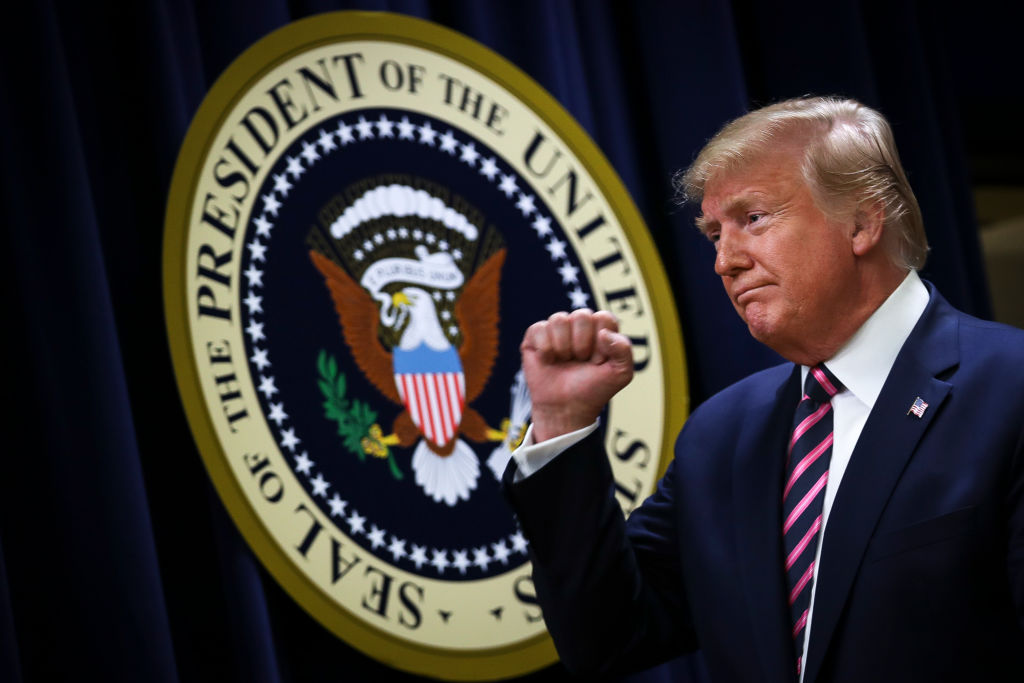(Jonathon Moseley) Speaker of the House Nancy Pelosi has delivered Articles of Impeachment of Donald J. Trump and the appointment of Impeachment Managers to the U.S. Senate on January 25. The Senate cannot legally hold a trial on impeachment of a President or other official who has already left office.
Related Is Trump’s Second Impeachment “Dead on Arrival”?
by Jonathon Moseley, January 27th, 2021
As we will watch, the Senate has extensive, long-established procedures — but only as its own rules. The Senate must convene the next day at 1:00 P.M. But the Senate typically schedules the actual trial for later. Chuck Schumer says the trial will start February 8. Senate rules require a trial, whereas the Constitution only allows the Senate to hold a trial should they choose. No trial is required. But in any trial, a motion to dismiss for lack of subject matter jurisdiction must be taken up first.
Remember: Democrats in the House were conducting impeachment hearings of President Richard Nixon for some serious crimes. It appeared that the votes were there in the Senate to remove Nixon from office. But when Nixon resigned, the entire effort stopped. Democrats then believed that they did not have the jurisdiction to proceed with impeachment. In December 2019, when Rep. Matt Gaetz suggested impeaching Barack Obama no longer in office, the Washington Post “fact checked” the idea as unlikely, with more professors arguing against than for.
There have been a couple past impeachments of former officials. But those cannot override the Constitution. It is unconstitutional even if the Congress impeached a few former officials before. There is no “precedent” that can change the Constitution.
To interpret our short Constitution, lawyers examine legal experiences from England and the American colonies as illuminating what the drafters of our Constitution were possibly thinking. That includes noticing when our Founders sharply diverged intentionally from English legal traditions. British impeachments were radically irrelevant because the English government had a completely different structure.
Early state constitutions are strongly inconsistent from one another, providing no guidance. However, the Massachusetts’ constitution is almost identical to the U.S. Constitution on this topic, with New Hampshire close. It offers no support for impeachment of former officials. Thus, it appears that the Constitutional Convention chose to follow the Massachusetts model while distinctly rejecting examples from other States. Despite the fact that some states knew how to explicitly allow for impeachment of former officials when they wanted to, neither the U.S. nor Massachusetts Constitution chose to follow the examples of other States. See, Brian C. Kalt, The Constitutional Case for the Impeachability of Former Federal Officials: An Analysis of the Law, History, and Practice of Late Impeachment, 6 Tex. Rev. L. & Pol. 13 (2001-2002).
Also, the U.S. Constitution rejects English tradition by shifting criminal prosecution after impeachment over to the regular courts. That is a sharp change. England’s Parliament could prosecute former officials for anything. But our Constitution explicitly divests Congress of prosecution after removal and entrusts the separate judicial branch for follow-up.
The U.S. Constitution segregates criminal prosecution by naming the President as the only prosecutor (who of course appoints assistants) and making the judiciary the only real courts. By contrast, the English Parliament had the ability to try anyone itself.
Article II, Section 4, says that: “The President, Vice President and all civil Officers of the United States, shall be removed from Office on Impeachment for, and Conviction of, Treason, Bribery, or other high Crimes and Misdemeanors.” However, Donald Trump is not President nor is he a “civil officer.” He is a private citizen. The Senate has lost jurisdiction.

Democrats argue that they can try a former President because they just want to disqualify him from holding future office. The Constitution says in Article I, Section 3, that: “Judgment in Cases of Impeachment shall not extend further than to removal from Office, and disqualification to hold and enjoy any Office of honor, Trust or Profit under the United States.” (That is a clear rejection of British practices.)
But it says “and,” not “or.” Removal from office is a requirement before disqualification can be on the table. The power is not removal “or” disqualification. The Senate cannot pick and choose whether to remove an official “or” disqualify the official. Remember that the focus is on “Judgment” — that is, conviction from a quasi-criminal trial. Disqualification is a by-product of removal from office.
Notice also the violence this does to the Constitution’s concepts: If a former official can be tried for impeachment and disqualified, this prevents the voters from deciding whether to vote for him or her next time. Voters cannot remove a federal official from the office they currently hold. So removal may be necessary to do what the voters cannot do.
But it is the voters who decide which candidate they want to vote for in the future. Depriving the voters of the power to choose their elected representatives is undemocratic. Therefore, expanding impeachment is probably not what was intended.
When precedent offers little legal guidance, it is often important to take a proposed idea for a test drive. Interpretations are disfavored if “strained, forced, or contrary to reason” or would lead to an absurd result. Courts actually use such tests.
So under Nancy Pelosi’s and Chuck Schumer’s proposed interpretation, why couldn’t a future Republican-controlled House of Representatives and Senate impeach a future Democrat candidate for President solely to disqualify the Democrat in the Presidential campaign?
If they cannot show a distinction between their proposal and absurd results, it is considered in the law a red flag that something is deeply wrong. What exactly would be different from the proposed impeachment trial of Donald Trump now and a future Congress merely picking off all the Democrat candidates one by one and disqualifying all of them? What in the proposed interpretation would stop a Republican House from impeaching every Democrat candidate for Congress and a Republican Senate from disqualifying them? That would make it easy to win elections.
So, the power to try an impeachment must be limited to those who are currently government officials. The alternative could produce absurd results. Note that that interpretation analysis does not require a belief that it might ever happen. It is enough that the proposed interpretation could create some absurd possibilities. Therefore, the Founders probably did not intend that. It is also not relevant that Congress has done it in the past.
We will face a curiosity: Chief Justice John Roberts is required to preside over a trial of the President. Roberts has declined that invitation. Roberts has slow-rolled several cases still in the Supreme Court that might make Trump still President under Article II, Section 1 of the Constitution. Scarnati is one of several cases still undecided. Should Roberts effectively endorse that Trump is now still President? By declining to walk across Second Street, N.E., Roberts emphasizes that Trump is no longer a civil officer subject to impeachment.
The Constitution requires that during an impeachment trial, the senators must be on “Oath or Affirmation.” Why? They can’t speak during the trial. They are on “Oath or Affirmation” to vote according to the Constitution and applicable laws.
Thus, whim is prohibited. They must vote on a motion to dismiss for lack of subject matter jurisdiction strictly according to legal considerations.
Stillness in the Storm Editor: Why did we post this?
The news is important to all people because it is where we come to know new things about the world, which leads to the development of more life goals that lead to life wisdom. The news also serves as a social connection tool, as we tend to relate to those who know about and believe the things we do. With the power of an open truth-seeking mind in hand, the individual can grow wise and the collective can prosper.
– Justin
Not sure how to make sense of this? Want to learn how to discern like a pro? Read this essential guide to discernment, analysis of claims, and understanding the truth in a world of deception: 4 Key Steps of Discernment – Advanced Truth-Seeking Tools.
Stillness in the Storm Editor’s note: Did you find a spelling error or grammatical mistake? Send an email to [email protected], with the error and suggested correction, along with the headline and url. Do you think this article needs an update? Or do you just have some feedback? Send us an email at [email protected]. Thank you for reading.
Source:
https://www.americanthinker.com/articles/2021/01/the_senate_cannot_impeach_donald_trump.html


Leave a Reply